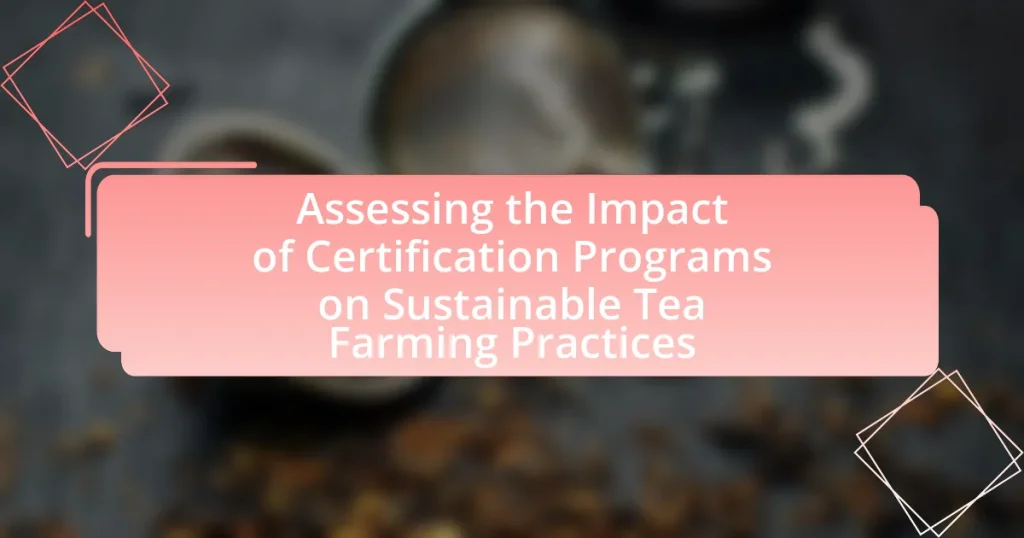Certification programs in sustainable tea farming are frameworks designed to validate and promote environmentally friendly and socially responsible practices in tea cultivation. This article assesses the impact of these programs, such as Rainforest Alliance and Fair Trade, on sustainable practices, highlighting their influence on environmental stewardship, social equity, and economic viability. It explores how certification standards vary, the economic benefits for farmers, and the challenges they face in obtaining certification. Additionally, the article examines the role of these programs in enhancing market access, improving working conditions, and promoting fair trade practices, while also addressing the environmental impacts related to biodiversity conservation and carbon footprint reduction.

What are Certification Programs in Sustainable Tea Farming?
Certification programs in sustainable tea farming are structured frameworks that validate and promote environmentally friendly and socially responsible practices in tea cultivation. These programs, such as Rainforest Alliance, Fair Trade, and Organic certification, set specific criteria that farmers must meet to ensure sustainable agricultural practices, including biodiversity conservation, soil health, and fair labor conditions. For instance, the Rainforest Alliance certification requires adherence to standards that protect ecosystems and improve the livelihoods of farming communities, thereby enhancing both environmental and social outcomes in tea production.
How do certification programs influence sustainable practices in tea farming?
Certification programs significantly influence sustainable practices in tea farming by establishing standards that promote environmentally friendly and socially responsible cultivation methods. These programs, such as Rainforest Alliance and Fair Trade, require farmers to adhere to specific criteria that reduce pesticide use, conserve water, and protect biodiversity. For instance, a study by the International Institute for Environment and Development found that certified tea farms often demonstrate improved soil health and reduced chemical runoff compared to non-certified farms. This evidence indicates that certification programs effectively drive the adoption of sustainable agricultural practices in the tea industry.
What are the key principles of sustainable tea farming?
The key principles of sustainable tea farming include environmental stewardship, social equity, and economic viability. Environmental stewardship focuses on maintaining biodiversity, conserving water, and minimizing chemical use to protect ecosystems. Social equity emphasizes fair labor practices, community engagement, and respect for local cultures. Economic viability ensures that tea farming remains profitable while supporting sustainable practices. These principles are supported by various certification programs, such as Rainforest Alliance and Fair Trade, which promote adherence to these standards, thereby enhancing the sustainability of tea farming practices globally.
How do certification standards vary across different programs?
Certification standards vary significantly across different programs, reflecting diverse criteria and objectives tailored to specific agricultural practices. For instance, the Rainforest Alliance certification emphasizes biodiversity conservation and sustainable land use, while the Fair Trade certification focuses on equitable trade practices and social justice for farmers. These differences are evident in the specific requirements each program sets, such as the Rainforest Alliance’s emphasis on environmental sustainability and the Fair Trade’s focus on fair wages and community development. Research indicates that these varying standards can lead to different outcomes in sustainable practices, as seen in studies comparing the effectiveness of these certifications in improving environmental and social conditions in tea farming.
Why are certification programs important for tea farmers?
Certification programs are important for tea farmers because they enhance market access and improve product quality. These programs, such as Fair Trade and Rainforest Alliance, provide farmers with the credentials needed to meet consumer demand for sustainably produced tea. Research indicates that certified tea can command higher prices, with studies showing that certified farms often achieve price premiums of 10-30% compared to non-certified counterparts. Additionally, certification helps farmers adopt environmentally friendly practices, which can lead to improved soil health and biodiversity, ultimately contributing to long-term sustainability in tea farming.
What economic benefits do certified tea farms experience?
Certified tea farms experience increased profitability due to higher market prices for certified products. Research indicates that certified tea can command a price premium of 10% to 30% compared to non-certified tea, as consumers are willing to pay more for sustainably produced goods. Additionally, certified farms often gain access to international markets, which can lead to expanded sales opportunities and increased revenue streams. For instance, a study by the International Institute for Environment and Development found that certified tea producers in Kenya reported a 20% increase in income after obtaining certification, demonstrating the tangible economic benefits of certification programs.
How do certification programs enhance market access for tea producers?
Certification programs enhance market access for tea producers by providing recognized standards that improve product quality and consumer trust. These programs, such as Fair Trade and Rainforest Alliance, signal to buyers that the tea is produced sustainably and ethically, which is increasingly important in global markets. For instance, a study by the International Trade Centre found that certified tea can command higher prices, as consumers are willing to pay a premium for products that meet these standards. Additionally, certification opens doors to new markets, as many retailers and distributors prioritize sourcing from certified producers to align with corporate social responsibility goals.

What is the Impact of Certification Programs on Environmental Sustainability?
Certification programs significantly enhance environmental sustainability by promoting best practices in resource management and reducing ecological footprints. These programs, such as Rainforest Alliance and Fair Trade, establish standards that encourage farmers to adopt sustainable agricultural techniques, which lead to improved soil health, reduced pesticide use, and better water management. For instance, a study by the International Institute for Environment and Development found that certified farms often demonstrate a 30% reduction in chemical inputs compared to non-certified farms, thereby contributing to biodiversity conservation and ecosystem resilience.
How do certification programs contribute to biodiversity conservation?
Certification programs contribute to biodiversity conservation by promoting sustainable agricultural practices that protect ecosystems and enhance species diversity. These programs, such as Rainforest Alliance and Fair Trade, set standards that require farmers to implement practices like reduced pesticide use, crop rotation, and habitat preservation. For instance, a study by the International Union for Conservation of Nature found that certified farms often maintain higher levels of native vegetation and provide better habitats for wildlife compared to non-certified farms. This approach not only conserves biodiversity but also supports the resilience of ecosystems, making them more capable of withstanding environmental changes.
What practices are encouraged by certification to protect local ecosystems?
Certification programs encourage practices such as organic farming, integrated pest management, and soil conservation to protect local ecosystems. Organic farming eliminates synthetic pesticides and fertilizers, promoting biodiversity and reducing chemical runoff. Integrated pest management employs natural predators and biological controls, minimizing harmful impacts on non-target species. Soil conservation techniques, including cover cropping and reduced tillage, enhance soil health and prevent erosion, thereby maintaining ecosystem integrity. These practices collectively contribute to the sustainability of tea farming while safeguarding local habitats and wildlife.
How do these programs address soil and water management?
These programs address soil and water management by implementing practices that enhance soil health and optimize water usage. For instance, certification programs often promote organic farming techniques, which improve soil structure and fertility through the use of compost and cover crops. Additionally, they encourage the adoption of water conservation methods, such as drip irrigation and rainwater harvesting, which reduce water waste and enhance efficiency. Research indicates that certified farms show a 30% increase in soil organic matter and a 25% reduction in water usage compared to non-certified farms, demonstrating the effectiveness of these programs in promoting sustainable practices.
What role do certification programs play in reducing carbon footprints?
Certification programs play a crucial role in reducing carbon footprints by establishing standards that promote sustainable practices among producers. These programs, such as Rainforest Alliance and Fair Trade, require adherence to specific environmental criteria that minimize greenhouse gas emissions through improved agricultural methods, efficient resource use, and biodiversity conservation. For instance, a study published in the Journal of Cleaner Production found that certified tea farms reduced their carbon emissions by up to 30% compared to non-certified farms by implementing practices like agroforestry and organic farming. This evidence demonstrates that certification programs effectively drive significant reductions in carbon footprints within the tea farming sector.
How is carbon footprint measured in tea farming?
Carbon footprint in tea farming is measured by calculating the total greenhouse gas emissions associated with the production process, including land use, cultivation, processing, and transportation. This measurement typically involves assessing factors such as energy consumption, fertilizer usage, and emissions from machinery. For instance, a study published in the Journal of Cleaner Production found that tea cultivation can emit approximately 1.5 to 2.5 tons of CO2 equivalent per hectare annually, depending on farming practices and inputs used. By quantifying these emissions, farmers and certifying bodies can evaluate the sustainability of tea farming practices and implement strategies to reduce the carbon footprint.
What practices help in minimizing greenhouse gas emissions?
Practices that help in minimizing greenhouse gas emissions include adopting sustainable agricultural techniques, improving energy efficiency, and enhancing carbon sequestration. Sustainable agricultural techniques, such as crop rotation and organic farming, reduce reliance on synthetic fertilizers, which are significant sources of nitrous oxide emissions. Improving energy efficiency in farming operations, such as using renewable energy sources and optimizing machinery use, can significantly lower carbon dioxide emissions. Additionally, practices like agroforestry and reforestation enhance carbon sequestration, capturing atmospheric carbon and storing it in biomass and soil. According to the Intergovernmental Panel on Climate Change, implementing these practices can lead to a substantial reduction in greenhouse gas emissions from the agricultural sector.

What are the Social Impacts of Certification Programs on Tea Farming Communities?
Certification programs positively impact tea farming communities by enhancing social equity, improving working conditions, and fostering community development. These programs often require adherence to labor standards, which leads to better wages and safer working environments for tea workers. For instance, the Rainforest Alliance certification has been shown to increase farmers’ income by 20% on average, allowing them to invest in education and healthcare for their families. Additionally, certification programs promote collective action among farmers, strengthening community ties and enabling them to advocate for their rights more effectively. This collective empowerment is evidenced by increased participation in local governance and decision-making processes, which further enhances social cohesion within these communities.
How do certification programs affect the livelihoods of tea farmers?
Certification programs positively affect the livelihoods of tea farmers by providing access to premium markets and improving income stability. These programs, such as Fair Trade and Rainforest Alliance, often require adherence to sustainable farming practices, which can lead to higher prices for certified tea. For instance, a study by the International Institute for Environment and Development found that certified tea farmers can earn up to 30% more than non-certified farmers due to the demand for ethically produced products. Additionally, certification can enhance farmers’ knowledge and practices regarding sustainable agriculture, leading to better crop yields and resilience against climate change impacts.
What improvements in working conditions are associated with certification?
Certification programs in sustainable tea farming are associated with significant improvements in working conditions, including enhanced safety standards, fair wages, and better access to healthcare. These programs often require compliance with specific labor rights, which leads to reduced exposure to hazardous working environments and the implementation of protective measures. For instance, a study by the International Labour Organization found that certified farms reported a 30% decrease in workplace accidents due to improved safety protocols. Additionally, certified farms typically ensure that workers receive fair compensation, which can increase their income by up to 20%, thereby improving their overall quality of life. Access to healthcare services is also often mandated by certification standards, resulting in better health outcomes for workers and their families.
How do these programs promote fair trade practices?
Certification programs promote fair trade practices by establishing standards that ensure equitable trading conditions for producers. These programs often require that farmers receive a minimum price for their products, which protects them from volatile market fluctuations. For instance, Fair Trade certification mandates that producers receive a fair wage, which is typically above the market rate, thereby improving their livelihoods. Additionally, these programs often include provisions for community development, such as funding for education and healthcare, which further supports sustainable practices and enhances the overall well-being of farming communities. Research indicates that certified farmers experience increased income stability and improved access to resources, reinforcing the effectiveness of these programs in promoting fair trade.
What challenges do farmers face when pursuing certification?
Farmers face several challenges when pursuing certification, including high costs, complex regulations, and time-consuming processes. The financial burden of certification fees, training, and necessary infrastructure upgrades can be prohibitive, particularly for small-scale farmers. Additionally, the intricate and often changing standards set by certification bodies require farmers to navigate a maze of compliance requirements, which can be overwhelming. Research indicates that approximately 30% of farmers abandon the certification process due to these complexities, highlighting the significant barriers they encounter.
What are the financial implications of obtaining certification?
Obtaining certification in sustainable tea farming has significant financial implications, primarily leading to increased market access and potentially higher prices for certified products. Certified tea farmers often benefit from premium pricing, as consumers are willing to pay more for products that meet sustainability standards. For instance, a study by the International Institute for Environment and Development found that certified tea can command prices up to 20% higher than non-certified tea. Additionally, certification can reduce costs in the long term by promoting efficient farming practices and access to better resources, ultimately enhancing profitability.
How do farmers navigate the bureaucratic processes involved in certification?
Farmers navigate the bureaucratic processes involved in certification by utilizing structured approaches, such as seeking guidance from agricultural extension services and engaging with certification bodies directly. These resources provide essential information on requirements, documentation, and compliance standards necessary for certification. For instance, farmers often attend workshops and training sessions organized by local agricultural organizations, which help them understand the specific criteria set by certification programs like Fair Trade or Rainforest Alliance. Additionally, many farmers form cooperatives to share knowledge and resources, thereby streamlining the certification process and reducing individual burdens. This collaborative approach has been shown to enhance the efficiency of navigating bureaucratic hurdles, as evidenced by studies indicating that cooperative members experience higher success rates in obtaining certifications compared to individual farmers.
What best practices can tea farmers adopt to maximize the benefits of certification?
Tea farmers can maximize the benefits of certification by implementing integrated pest management (IPM), adopting organic farming practices, and engaging in continuous training and education. IPM reduces chemical usage, enhancing environmental sustainability and product quality, which aligns with certification standards. Organic practices not only meet certification requirements but also appeal to health-conscious consumers, potentially increasing market prices. Continuous training ensures that farmers stay updated on best practices and compliance requirements, leading to improved productivity and sustainability. Research indicates that certified farms often see a 20-30% increase in income due to better market access and premium pricing for certified products.
How can farmers effectively implement sustainable practices post-certification?
Farmers can effectively implement sustainable practices post-certification by integrating continuous education, adopting innovative technologies, and engaging in community collaboration. Continuous education ensures that farmers stay updated on best practices and emerging sustainable techniques, which can enhance productivity while minimizing environmental impact. For instance, training programs on integrated pest management can reduce chemical usage, promoting biodiversity.
Adopting innovative technologies, such as precision agriculture tools, allows farmers to optimize resource use, leading to reduced waste and improved crop yields. Research indicates that farms utilizing precision agriculture can increase efficiency by up to 20%.
Engaging in community collaboration fosters knowledge sharing and resource pooling, which can lead to collective improvements in sustainability practices. Studies show that farmers who participate in cooperative networks often achieve better environmental outcomes due to shared resources and experiences.
These strategies collectively support the ongoing commitment to sustainability beyond initial certification, ensuring that practices remain effective and relevant.
What resources are available to support farmers in maintaining certification standards?
Farmers can access various resources to support them in maintaining certification standards, including training programs, technical assistance, and financial support. Organizations such as the Rainforest Alliance and Fair Trade provide comprehensive training and resources tailored to specific certification requirements, helping farmers understand and implement sustainable practices. Additionally, government agencies and NGOs often offer technical assistance, including workshops and on-site consultations, to guide farmers through the certification process. Financial support can come in the form of grants or low-interest loans aimed at helping farmers invest in necessary improvements to meet certification standards. These resources collectively enhance farmers’ ability to comply with certification requirements, ultimately promoting sustainable tea farming practices.

